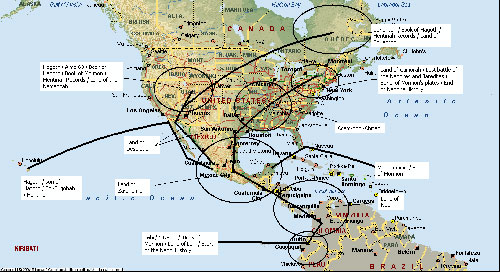On the Trail of the Plates of Mormon by uft36.
In conversations, uft36 has said he does not believe that a group of people would stay in one area for hundreds of years as the Jaredites, Mulekites and Nephites did. He argued, they must have been separated by hundreds of miles or else they would have “run into each other.”
Our reply:
- People move to look for food or water; they had plenty of both.
- People move for safety reasons. Take the example of Alma and “the people of the Lord” (Mosiah 18:34-35) who fled from the armies of King Noah. They traveled a mere eight days and there built a city. (Mosiah 23:3,20)
- They were surrounded by thick wilderness.
- They were surrounded by deadly animals.
- They were surrounded by Lamanites and later Gadianton Robbers.
- God appointed the time they would “run into” each other.
- The Pilgrims (as an example) did not go anywhere for a hundred years.
Perhaps the greatest evidence that people do stay put, for hundreds of years is the fact that Native American Indians were diversified in languages so much that one tribe could not understand another less than 20 miles away:
It is worthy of remark that so great a diversity of language exists among the numerous tribes. They vary frequently not over 5 or 6 miles; (The Dutch mile is equivalent to 3 and a fraction English miles.) forthwith comes another language; they meet and can hardly understand one another. There are some who come 60 miles from the interior and can not well understand those on the river. (William A. Ritchie, Pre-Iroquoian Occupations of New York, Rochester Museum of Arts and Sciences, Rochester, NY, 1944, p. 20)
If their needs were being met:
If his habitation had been at all fixed previously, it was due to favorable shelter or protection or a perennial food supply as fish, game, etc. Now there was a further incentive to live in or near one locality. He must remain to gather the fruits of his labor. (Lyman Carrier, The Beginnings of Agriculture in America, 1923, p. 7)
The people in the Book of Mormon were sustained through agriculture, which was reason enough to stay local and reap the bounty of their crops (2 Nephi 5:11; Enos 1:21; Mosiah 9:9, 10:4).
